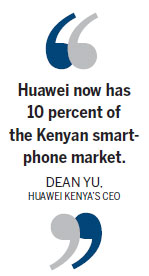Minister hails Chinese company's presence as competition in Nairobi heats up
The Chinese conglomerate Huawei Technologies Co Ltd has opened its first outlet in Kenya, signaling the start of a price war that could benefit Kenyan consumers.
In an address at the opening ceremony in Nairobi, Fred Matiangi, Cabinet secretary for Information, Communication and Technology, said the government was grateful for the support Huawei had given the ministry as the country's information, communication and technology sector grows.
|
From left: Shop owner Ronald Wang, Huawei Kenya CEO Dean Yu and the economic and commercial counselor at the Chinese embassy in Nairobi, Guo Ce, open the first Huawei shop in Kenya. Photos Philip Etyang / China Daily |
|
Fred Matiangi, Cabinet secretary for Information, Communication and Technology, tries a Huawei smartphone. |
|
Huawei smartphones and products on display. |
Also present at the ceremony were Guo Ce, economic and commercial counselor at the Chinese embassy in Nairobi, and Dean Wu, chief executive of Huawei Kenya.
Matiangi said he had been told the shop's opening has created jobs for 26 Kenyans.
"I want to urge Huawei to open yet another branch and employ another 26 Kenyans."
Matiangi said the ministry, like most Kenyans, is concerned about the high cost of smart devices. The government, with a team of experts, is formulating proposals that will make the devices significantly cheaper, he said.
At present the average price of smartphones in the country is about $100, yet most Kenyans live on less than $1 a day.
"The government is working hard to ensure that the cost of developing smartphones in Kenya is pushed down in the next few months," Matiangi said.
In the new shop the prices of phones range from 54,000 shillings ($530) to 9,000 shillings ($88).
Matiangi lauded a company program in Kenya called Huawei Seeds for the Future in which Kenyan graduates have gone to China for specialized training, and he called on the company to increase the number of locals trained in the program.

Under the program set up in June last year, 28 Kenyan engineering students train at Huawei's headquarters in Shenzhen, Guangdong province. This year 10 students were selected for the program. It is expected that 40 students will have completed the two-month internship program by the end of this year and that 100 students will have gone through the program in three years.
The target group is engineering students from Kenyan universities. Four students from the program have been employed at Huawei Kenya, the company says, four have been employed by the Kenya Education Network, which promotes the use of information, communication and technology in teaching, one has been employed by McKinsey Consulting (Kenya) Ltd, and 22 others have returned to university to complete their studies.
Huawei says Kenya's Information, Communication and Technology Authority signed a memorandum of understanding with it in June last year to develop local talent, enhance knowledge transfer, promote a greater understanding of, and interest in, the ICT sector, and improve and "encourage regional building and participation in the digital community".
In an interview with China Daily, Matiangi said the government is doing all it can legislatively and with policy to encourage foreign investors such as Huawei to enter the Kenyan market.
The government's main role is to support private businesses that create jobs because the government alone cannot do as well in that regard, he says.
"As a ministry, we have partnered with the immigration department to facilitate foreign investors with easy access to work permits and visas. Kenya is a regional ICT hub with household names in the sector such as IBM, Oracle, Microsoft and Cisco having their headquarters in Nairobi and serving the entire East African region."
Yu says Huawei has a presence in more than 140 countries worldwide and has been in Kenya for the past 15 years. The shop's opening will strengthen the relationship the company has with its customers, he says.
"The devices you see here today are a result of online research we conducted in the Kenyan market."
Huawei has had a long-standing partnership with Kenya's largest mobile phone operator, Safaricom Limited.
"Huawei now has 10 percent of the Kenyan smartphone market," Yu says.
"We project that by the first half of next year we will have at least 20 percent of the market as a result of opening this store."
Mary Wanjala, the manager of the Tecno shop across the road, welcomed the competition.
"We have been here for the past one and half months, and business is good."
Ibrahim Kiprop, a sales trainer with Huawei, says its main rivals are Samsung and Apple rather than Tecno.
"Huawei is an international brand that competes with other known brands globally. Here we sell high- end smartphones as well as quality and affordable smartphones for the average Kenyan consumer."
There were prizes to be won at the event as organizers encouraged shoppers to buy mobile devices and accessories. One customer won a washing machine and another a smartphone.
Both were exuberant after being told of their wins, and the smartphone winner immediately put his prize to good use: he began snapping selfies.
For China Daily
(China Daily Africa Weekly 11/06/2015 page23)
A Frenchman in a coastal Chinese city has combined his zeal for work with passion for life, writes Raymond Zhou.

One of the potentially most traumatic things a girl has to go through is finding a new hairdresser.